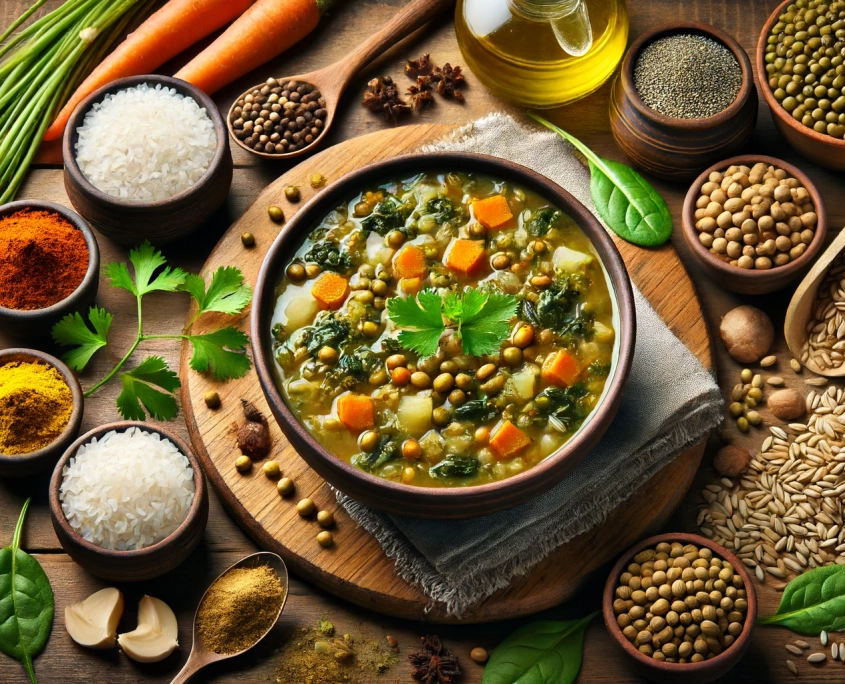Nourishing Balance: The Mung Bean and Rice Diet for Holistic Health
A Healing Recipe from Yogi Bhajan’s Kundalini Yoga Tradition
The pursuit of optimal health and well-being often leads to the exploration of various dietary practices rooted in ancient traditions. One such regimen is the Mung Bean and Rice Diet, popularized by Yogi Bhajan, the spiritual leader responsible for introducing Kundalini Yoga to the West. This dietary practice is not merely a meal plan but a comprehensive approach to cleansing, nourishment, and holistic healing.
The Recipe
Ingredients:
2 cups mung beans (soaked overnight)
1/2 cup Basmati rice (rinse clean)
1-2 tablespoons ghee or coconut oil
1 teaspoon cumin seeds
1 teaspoon coriander seeds
1 teaspoon turmeric powder
1 teaspoon grated ginger
5-6 cloves garlic, whole or chopped
8-9 cups water, vegetable, and/or bone broth (to desired consistency)
Assorted vegetables (e.g., carrots, spinach, celery)
Sea salt and black pepper to taste
Fresh cilantro for garnish
Instructions:
Heat the ghee or oil in a large pot.
Add cumin seeds and coriander seeds, allowing them to sizzle for a minute.
Add grated ginger and garlic, sautéing until fragrant.
Mix in turmeric powder.
Combine the soaked mung beans and rice, stirring to coat with spices.
Pour in water or vegetable broth and bring to a boil.
Reduce heat, cover, and simmer for about 30-40 minutes, until beans and rice are tender.
Add vegetables in the last 10-15 minutes of cooking.
Season with salt and pepper to taste.
Garnish with fresh cilantro before serving.
Therapeutic Rationale
Detoxification
The Mung Bean and Rice Diet is well-regarded for its detoxifying properties. Mung beans are rich in antioxidants and nutrients that facilitate the elimination of toxins from the body. The inclusion of turmeric, a spice known for its anti-inflammatory and detoxifying properties, enhances this effect, promoting overall bodily cleansing.
Digestive Health
Mung beans are known for their ease of digestion and beneficial impact on gut health. The high fiber content aids in regular bowel movements, while their prebiotic properties support a healthy gut microbiome. When paired with the easily digestible Basmati rice, this diet ensures that the digestive system is not overburdened, fostering improved gastrointestinal function.
Nutrient Balance
The combination of mung beans and rice provides a complete protein source, offering all essential amino acids necessary for various bodily functions. This balance is crucial for muscle repair, immune function, and overall vitality. The inclusion of a variety of vegetables further enhances the nutritional profile, adding essential vitamins, minerals, and antioxidants.
Energy and Vitality
Patients adhering to the Mung Bean and Rice Diet frequently report increased energy levels and a heightened sense of well-being. This can be attributed to the diet’s ability to stabilize blood sugar levels and provide sustained energy through a balance of complex carbohydrates and proteins.
Historical Context
Yogi Bhajan, the master of Kundalini Yoga, placed significant emphasis on the role of diet in achieving physical, mental, and spiritual well-being. When he introduced Kundalini Yoga to the Western world in the late 1960s, he brought with him a wealth of knowledge regarding yogic traditions, including dietary practices. The Mung Bean and Rice Diet emerged as a cornerstone of his teachings, embodying the simplicity and profundity of yogic wisdom.
In the formative years of his teaching, Yogi Bhajan often recommended this diet to his students, particularly those facing health challenges. His advice was both simple and potent: “Go home and eat your mung beans and rice.” This diet was viewed as a means to purify the body, calm the mind, and prepare for deeper spiritual practices. Its simplicity and accessibility reinforced the idea that profound healing can be achieved through natural, whole foods.
The Mung Bean and Rice Diet represents more than a mere dietary regimen; it embodies a holistic approach to health and well-being. Rooted in the ancient traditions of Kundalini Yoga and popularized by Yogi Bhajan, this diet offers a straightforward yet effective method for cleansing, nourishing, and healing the body. By incorporating this diet into their daily lives, individuals can experience numerous benefits, including improved digestion, detoxification, increased energy, and enhanced overall health.
We encourage our patients to adopt this dietary practice, embrace its simplicity, and discover the transformative potential of natural, whole foods. By preparing and enjoying this dish, individuals participate in a time-honored tradition that nourishes and supports all systems.

